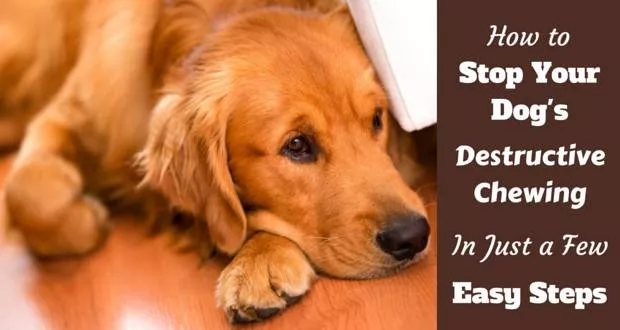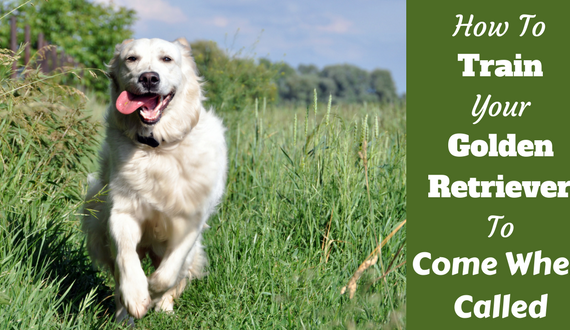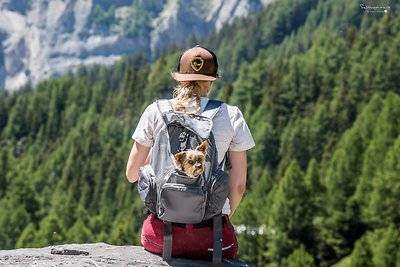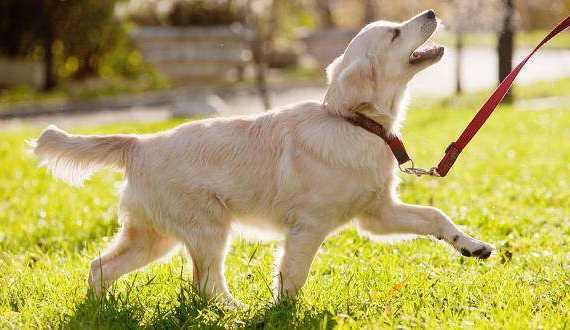Updated: July 3rd, 2023

If you’d visited my family’s home prior to the completion of some recent renovations, you’d have been forgiven for thinking I shared the place with a pack of beavers. The evidence was everywhere: a video game system with teeth marks, a bite out of my sandals, and gnawed MDF trim at every turn.
QUICK RECOMMENDATION: My puppies have drawn blood with their teeth many times. The Milunova Pupr Pals™ Dog Toy is a plush squirrel puppet toy that helps to protect your hands from those sharp puppy teeth during play.
Though I’m a proud Canadian, I draw the line at giving shelter to semi-aquatic rodents. The real culprit? Our new puppy and his needle-sharp teeth of destruction.
Had I read this article back then, I could have prevented the devastation. Instead, you get to reap the benefits of my lack of foresight and research.
Why Do Dogs Chew?
To solve a problem, we must first seek to understand the cause. That’s a deep thought, but it’s the basis for all corrective measures. Not every dog will chew for each of these reasons, but they can be a guideline for you as you try and seek the underlying issue.
- Exploration – Puppies learn about the world through chewing, much as human babies do. Unfortunately, puppies get their teeth very early on!
- Teething pain – As these first teeth come in, puppies will chew to try and alleviate the pain.
- Boredom – A puppy or adult dog may start chewing to keep occupied if it has nothing else to do.
- Mild anxiety – When a dog is frightened, upset, or nervous, it may chew as a method of self-soothing, or to distract itself.
- Lack of training – If a puppy isn’t taught what is and is not okay to chew on, you can’t expect it to figure it out as an adult!
- Seeking attention – A dog that feels neglected may engage in destructive chewing (and other undesirable habits) to get its owner’s attention, even if it’s negative.
- Medical/Mental issues – Less commonly, a dog might chew as the result of a medical issue (perhaps an oral disease), or mental disorder, like OCD.
Chewing Is A Natural Behavior
Dogs love to chew, and you shouldn’t try to stop them altogether. Chewing relieves pain, educates, entertains, and even cleans teeth. What you want to do is stop your Retriever from chewing on things you’d rather keep intact, like shoes, rugs, and furniture.
With that in mind, here are some strategies you can employ to help end destructive chewing in your home.
Out of Sight…
The simplest thing you can do to keep particular items from being chewed is to put them where they cannot be reached. If you’re planning on bringing a dog into your home for the first time, walk (or crawl!) around and look for anything that seems like it might be a tempting tooth target.
If the item is small enough, move it to another location. Examples include throw pillows (which I hate anyway), knick-knacks, and anything small and loose on a low shelf or table.
Garbage cans are also a source of interesting chew toys for dogs. Keep small bins inside cabinets where possible, and use a lidded container if it has to be out in the open.
Get in the habit of putting things away when you’re done with them. Remote controls, cell phones, and Nintendos are no match for the jaws of a Golden.
Teaching Your Puppy to Stop Its Destructive Chewing
Chew training is an essential part of your dog’s upbringing. Done right, it should carry the lesson through its youth and into adulthood. Teaching your puppy what it can and cannot chew sets the stage for fewer problems in later life.
Supervise Your Puppy
The classic destructive chewing scenario is arriving home to find the scattered remains of a couch cushion, or some such item, all over the room. You never see it happen, do you?
A watchful eye will go a long way toward curbing chewing. As they say, ‘an ounce of prevention is worth a pound of cure’ and if you’re there to correct your pup the moment they start chewing, or prevent it altogether, it may never become a problem.
Of course, no one can realistically expect to monitor a puppy 24/7. When you have to leave a puppy alone, confine it to a room where it can’t get into trouble, or keep it in its crate, if you’re crate training. Leave a few toys behind that are ok to chew on to keep the puppy happy.
Chew the Right Thing
As mentioned above, you can’t stop a puppy from chewing, so make sure it chews something appropriate. Have on hand an assortment of chew toys sized appropriately for your Lab. (If it’s too big, it can’t be chewed effectively, and if it’s too small, it’s a choking hazard.)
Have in your chewing arsenal a few items designed to promote dental and gum health. It only makes sense to take advantage of the behavior where you can!
Choose toys that don’t resemble things you wouldn’t want to be chewed, such as shoes/slippers, human food, or stuffed animals (if you have kids with their own stuffies).
Distract & Redirect
When you catch your puppy chewing on something undesirable (and you will), you first want to get its attention and distract it from what it’s doing. Make a loud noise and then scold your Retriever. Around our house, we use a combination of a stern voice and a pointing index finger to express displeasure.
Remove the item being chewed from the immediate area, or move the dog away if it’s a larger or immovable item.
Of course, removing the item doesn’t remove the desire to chew, so the next step is to offer an appropriate substitute from your collection of chew toys. When your puppy takes the item and begins to chew on it, offer copious and heartfelt praise for being so good.
Repetition of this process will teach your puppy that it’s ok to chew, so long as the right things are being gnawed.
Teething Pain
Of course, none of us can remember what it felt like to have our teeth come in, but if it’s anything like a toothache, it must be awful. Your puppy combats this discomfort by chewing.
For a very young Golden that’s teething (3-6 weeks), you might try freezing a wet washcloth and then offering it as a chew toy. Supervise your pup when it chews this, or any other item that could possibly break into pieces, to avoid choking on any small bits.
Teaching Your Adult Golden Retriever to Stop Destructive Chewing
It may well be that your adult Golden still chews on things it’s not supposed to from time to time. Perhaps it wasn’t trained as a puppy, or perhaps something has caused it to regress, or simply ignore what it’s been taught. (My own dog will occasionally stand and stare at me as if he has never heard the word “sit” in his life!)
If you don’t suspect any serious reasons for the behavior, such as a medical condition, then there are some techniques you can try that may help minimize the problem.
Spend Time With Your Dog
Your dog loves you and loves feeling like part of the pack! Make sure you include your Lab in family activities. This can be as simple as inviting it to join in when you watch TV, or while you’re getting ready for work in the morning. Take a book to wherever your Retriever is hanging out, or bring it out to the backyard while you tend the garden.
Exercise Regularly
All dogs need exercise to keep them healthy. A long walk (or a short brisk one), a good game of ‘fetch’, or simply running around and having fun, are all great ways of getting activity.
A great side benefit of physical activity is a tired dog; once worn out, (or at least satiated) a Lab is far less likely to be interested in chewing.
Exercise your Golden’s mind, too. Though they generally have a demeanor that leans towards the sweet and playful side, they are very intelligent animals.
You might enroll in an agility-training course, or offer puzzle-style toys to keep your dog thinking. Remember, an inactive mind is prone to boredom, and boredom leads to the dark side. (Sorry, I just watched Star Wars again!)
Barter With Your Barker
If you see your dog chewing on something that’s off-limits, offer a trade. Bring out a favorite toy, and encourage a swap.
Alternatively, you can offer a treat as a reward for releasing the offending item. If your Golden doesn’t already know a command such as “give it,” “leave it,” or “drop it,” this is a perfect time to teach one.
A Matter of Taste
You may find that there is one object in your home that your Retriever finds irresistible which cannot be relocated, usually a rug or piece of furniture. As a last resort, try introducing an unpleasant flavor to the item.
Taste deterrents are meant to discourage a dog from chewing by “rewarding” them with a mouth full of yuck. Commercially available formulas generally use either bitter or spicy flavors to deter chewing and licking. You could also make your own with a mixture of vinegar and lemon juice.
Test your Golden’s aversion to the product by spraying some on a cloth and encouraging it to take a sniff or have a lick. Ideally, your dog will be so repelled by the spray, that he or she will want nothing to do with it. What you don’t want is to find out after the fact that you’ve made the item even tastier!
Once you’ve found the right mix, apply it to the item you’re trying to protect. Remember to reapply periodically, as it will wear off over time.
What Not To Do
Now that you’ve got a list of methods to try, here are a couple of things you should avoid:
Punishing After the Fact
When dealing with destructive chewing, what’s done is done. Though it’s natural to want to punish your dog when you know perfectly well it’s responsible for the hole in your drywall, resist.
A dog is not able to make the connection between a scolding and a past event. All it knows is that you’re upset with it, and it has no clue why. The end result is a sullen dog that still hasn’t learned not to chew. You know those adorable Internet memes and videos showing guilty-looking dogs? The dogs don’t feel guilty; they feel sad and confused.
Reserve your punishments for when you catch your Golden in the act of chewing. In order to learn a lesson, the connection with the unwanted behavior must be immediate.
Turning It Into A Game
Your dog grabs a $200 leather dress shoe and makes a run for it. Should you give chase? All your instincts say yes, but they’re wrong!
‘Keep away’ is one of the best games a dog knows, and if you chase after the shoe your Retriever will think it’s play time! Instead, immediately call your dog and offer a trade or a treat. This would be another opportune time to brush up on the ‘drop it/give it/leave it” command.
When All Else Fails
If you are unable to break your dog’s destructive chewing habit, it may be there is a more serious underlying problem, either mental or physical. If so, it may be beyond your ability to correct. That’s ok!
As mentioned earlier, chewing can indicate any one of a number of issues that aren’t readily apparent such as extreme anxiety, insecurity, or an obsessive disorder.
You can read our series of articles regarding alternative treatments for dogs with anxiety –
For some issues, time may the only thing that curbs the issue. (Our own rescue dog, a Shepherd, chewed the fence relentlessly until she became comfortable with her new home and family.)
If nothing seems to help, don’t be afraid to consult a professional such as a vet, or trainer. They make a living by helping dogs live better lives, and that’s what you want as an owner.
“Get Us Out of Here, Chewie!”
(Did I mention I’d been watching Star Wars?) In conclusion, it’s important to always remember that chewing is a natural behavior that needs to be redirected, not eradicated.
Persevere, and in time you’ll find that your pillows and your pup can safely coexist. Now if only there’s a way to stop your golden retriever from shedding! Let’s be realistic and rely on pet vacuums showcased on petallergyvacuum guide instead.



